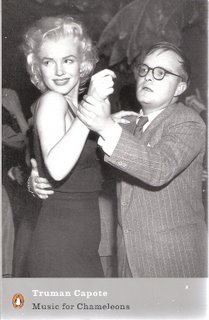 Review: Music for Chameleons: New Writing, Truman Capote (1980)
Review: Music for Chameleons: New Writing, Truman Capote (1980)In the perfectly-formed stories that open this collection, Capote reveals his artistry in its full splendour: a curved niche filled to overflowing with exotic pleasures. The prologue, however, is a curious concoction that scans over his life’s work with a calm brush. Nary a skeleton emerges from this closet. His “personal problems”? Not a whiff of alcohol or cocaine raises its ugly head in this little whitewash.
Lucky he’s such a good writer. Of course, we wouldn’t be interested in him if it weren’t for the exalted company that he chose to keep! The rich girlfriends. The stylish millionaires. All of the so-called friends who deserted him en masse when he released a few chapters of, what was to be his finest creation, Answered Prayers.
Ingrates.
Lucky he’s such a good writer, or we wouldn’t be able to stand him.
Luck, according to Capote, never entered into it. From the age of eight, he was writing stories. It shows. Short vignettes that gesture to farther shores, such as ‘Mr. Jones’, are bolstered by the effervescent retro-weirdness of ‘A Lamp in the Window’ and the title piece, which consists of a meandering conversation with a romantic septuagenarian in Martinique.
He is on top of his game, even at this late stage. “Locking himself in his First Avenue apartment for days and spending very little time partying or carousing,” says the Wikipedia, “this burst of creativity gave brief hope to those who felt that Capote's addictions were beyond help.” And, of course, they were. But you wouldn’t know it from reading this book.
‘Mojave’ meanders like the Euphrates through dreamless plains and dazzling skies that lower like yellow corn. A deathless story without a plot, a curtain without a stage, a block of ice without a glass to hold it.
The centrepiece in the collection, 'Handcarved Coffins: A Nonfiction Account of an American Crime', is a strange and disturbing set of conversations held with an FBI investigator, Jake Pepper, who is working on a series of murders. He falls in love with a potential victim, with disastrous consequences. The initial meeting with Pepper in "[a] town in a small Western state" is broken by the author's return to New York. Their contacts will be sporadic, and extend over a period of years, as Capote follows the case with his usual insatiable interest. The way it plays out, the abrupt denouement, make this particular crime not just "American" but haunting.
The third section of the collection is made up of a series of non-fictional encounters with people around New York. For me, the most memorable is his day spent following a cleaning lady around her jobs, shrouded in a fog of marijuana smoke. 'A Day's Work' is a satisfying read, as everything Capote produced was. 'Hello Stranger' is especially poignant, and shows Capote at his empathetic best, assuaging the fears of an old friend in a New York restaurant. 'Then It All Came Down' sees Capote once more holed up with a murderer in a San Fransisco prision. 'Derring-do' shows a comical side we seldom see, and recounts a true episode from the writer's life when he was charged with contempt of court for not obeying a summons. Finally, 'Nocturnal Turnings, or How Siamese Twins Have Sex' is a conversation that Capote has with himself. It is whimsical and wise.
2 comments:
Post a Comment